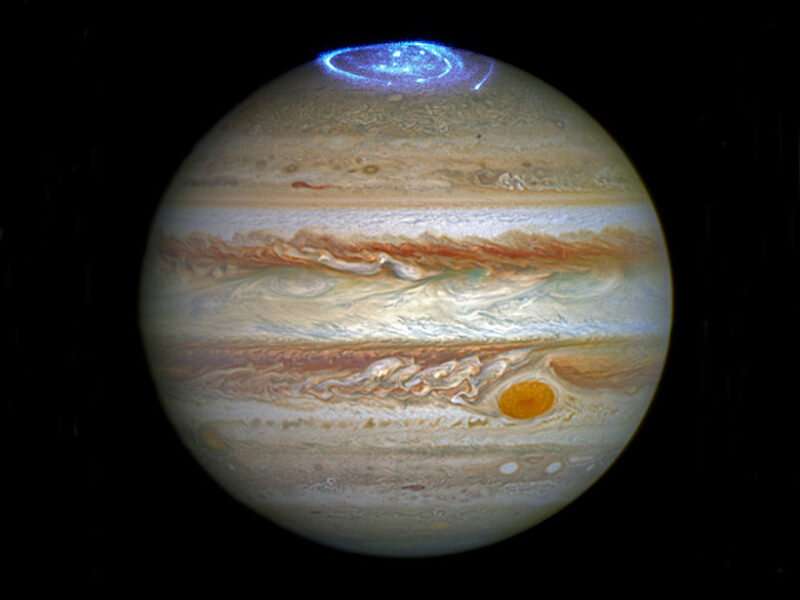
Copernical Team
Scores of internet-providing satellites will soon streak across Canada's skies, but at what cost?

The night sky is going to get much busier thanks to thousands of new internet satellites set to launch over the next few years—and researchers say it's going to affect Canada more than most places on Earth.
Researchers from the University of Toronto, the University of Regina and the University of British Columbia found that most light pollution is expected to happen near 50 degrees latitude north and south due to the orbits of the new satellites.
NASA's mixtape for extraterrestrial civilizations

In 1977, NASA created two LP records with tracks of global music, greetings in different languages, sounds of the planet, and sonified images, and then attached them to the two robotic probes launched that year as part of the Voyager space mission bound for the outer solar system and beyond. This Golden Record, said Alexander Rehding, Fanny Peabody Professor of Music, is "effectively a mixtape for extraterrestrial civilizations, a sign that we exist and a glimpse of what human culture is about.
Could low-altitude reconnection power Jupiter's polar aurorae?

Like Earth, Jupiter's magnetic field channels electrically charged particles into its atmosphere, resulting in the formation of brilliant aurorae near its poles. However, the brightness and variety of Jupiter's auroral emissions exceed those generated on our planet. Of particular interest are patches of emission that originate from even closer to the poles than the main aurorae, a feature that appears far stronger at Jupiter than at Earth or Saturn.
This is what it looks like when a black hole snacks on a star
 While black holes and toddlers don't seem to have much in common, they are remarkably similar in one aspect: Both are messy eaters, generating ample evidence that a meal has taken place.
But whereas one might leave behind droppings of pasta or splatters of yogurt, the other creates an aftermath of mind-boggling proportions. When a black hole gobbles up a star, it produces what astronomers
While black holes and toddlers don't seem to have much in common, they are remarkably similar in one aspect: Both are messy eaters, generating ample evidence that a meal has taken place.
But whereas one might leave behind droppings of pasta or splatters of yogurt, the other creates an aftermath of mind-boggling proportions. When a black hole gobbles up a star, it produces what astronomers How planets may be seeded with the chemicals necessary for life
 Analysis of unique "fingerprints" in light emitted from material surrounding young stars has revealed "significant reservoirs" of large organic molecules necessary to form the basis of life.
Dr John Ilee, Research Fellow at the University of Leeds who led the study, says the findings suggest that the basic chemical conditions that resulted in life on Earth could exist more widely across th
Analysis of unique "fingerprints" in light emitted from material surrounding young stars has revealed "significant reservoirs" of large organic molecules necessary to form the basis of life.
Dr John Ilee, Research Fellow at the University of Leeds who led the study, says the findings suggest that the basic chemical conditions that resulted in life on Earth could exist more widely across th Observations in stellar factory indicates start of planet production
 Using radio data from the ALMA observatory and physical modelling, astronomers led by Kamber Schwarz (Max Planck Institute for Astronomy and University of Arizona) have managed to determine the mass of a potential "planet factory," the protoplanetary disk around the star GM Aurigae. From their reconstruction, which includes a determination of the disk's temperature profile, the astronomers deduc
Using radio data from the ALMA observatory and physical modelling, astronomers led by Kamber Schwarz (Max Planck Institute for Astronomy and University of Arizona) have managed to determine the mass of a potential "planet factory," the protoplanetary disk around the star GM Aurigae. From their reconstruction, which includes a determination of the disk's temperature profile, the astronomers deduc Mushballs stash away missing ammonia at Uranus and Neptune
 Mushballs - giant, slushy hailstones made from a mixture of ammonia and water - may be responsible for an atmospheric anomaly at Neptune and Uranus that has been puzzling scientists. A study presented by Tristan Guillot at the Europlanet Science Congress (EPSC) 2021 shows that mushballs could be highly effective at carrying ammonia deep into the ice giants' atmospheres, hiding the gas from detec
Mushballs - giant, slushy hailstones made from a mixture of ammonia and water - may be responsible for an atmospheric anomaly at Neptune and Uranus that has been puzzling scientists. A study presented by Tristan Guillot at the Europlanet Science Congress (EPSC) 2021 shows that mushballs could be highly effective at carrying ammonia deep into the ice giants' atmospheres, hiding the gas from detec China brings astronauts back, advances closer to "space station era"
 Having worked in the space station core module Tianhe for three months - the longest-ever human space mission in the Chinese history, three "taikonauts" of the Shenzhou-12 crew returned to Earth on Friday, hitting a new milestone in China's space exploration.
With a resolution for self-reliance in aerospace technology and an open mind for international cooperation, these years China has be
Having worked in the space station core module Tianhe for three months - the longest-ever human space mission in the Chinese history, three "taikonauts" of the Shenzhou-12 crew returned to Earth on Friday, hitting a new milestone in China's space exploration.
With a resolution for self-reliance in aerospace technology and an open mind for international cooperation, these years China has be DOD taking measures to protect nuclear weapons, space assets
 The Defense Department relies on nuclear-armed bombers, submarines and intercontinental ballistic missiles, as well as space-based sensors, to provide a strategic deterrence umbrella for the homeland and to protect deployed forces, allies and partners.
However, sensitive microelectronics used in these assets could be vulnerable to high levels of ionizing radiation caused by a number of fac
The Defense Department relies on nuclear-armed bombers, submarines and intercontinental ballistic missiles, as well as space-based sensors, to provide a strategic deterrence umbrella for the homeland and to protect deployed forces, allies and partners.
However, sensitive microelectronics used in these assets could be vulnerable to high levels of ionizing radiation caused by a number of fac Mars habitability limited by its small size, isotope study suggests
 Water is essential for life on Earth and other planets, and scientists have found ample evidence of water in Mars' early history. But Mars has no liquid water on its surface today. New research from Washington University in St. Louis suggests a fundamental reason: Mars may be just too small to hold onto large amounts of water.
Remote sensing studies and analyses of Martian meteorites datin
Water is essential for life on Earth and other planets, and scientists have found ample evidence of water in Mars' early history. But Mars has no liquid water on its surface today. New research from Washington University in St. Louis suggests a fundamental reason: Mars may be just too small to hold onto large amounts of water.
Remote sensing studies and analyses of Martian meteorites datin 































